 Global ambassadors of ecotourism gather in Nanjing
Global ambassadors of ecotourism gather in Nanjing
 Taiwan woman marries into Kazak family, 100 sheep plus a flat as dowry
Taiwan woman marries into Kazak family, 100 sheep plus a flat as dowry
 College girls take graduation photos under water in Chongqing
College girls take graduation photos under water in Chongqing
 Cartoon: Xi and football
Cartoon: Xi and football
 Chinese influence sweeps ROK
Chinese influence sweeps ROK
 Post-90s beauty boxer grapples four men
Post-90s beauty boxer grapples four men
 3,000-year-old tea town through lenses
3,000-year-old tea town through lenses
 22 archaeological sites along Silk Road in China
22 archaeological sites along Silk Road in China
 Football babies, Samba dancers embrace 'World Cup'
Football babies, Samba dancers embrace 'World Cup'
 Beautiful scenery along China’s Grand Canal
Beautiful scenery along China’s Grand Canal
QINGDAO, Shandong, July 3 -- President Xi Jinping's two-day state visit to the Republic of Korea (ROK) which began on Thursday, has brought the feel good factor to China's Korean business community.
"I am looking forward to breakthroughs in the China-ROK Free Trade Area (FTA) negotiations, tariff reductions and RMB-Korean won direct settlement," said Youngchul Lim, 51, a Korean who runs an electronics company in east China's Qingdao City.
Qingdao Toptone Electronics was the first business wholly funded by ROK capital in China, 25 years ago. Qingdao Toptone designs and develops computer speakers for big Korean firms like Samsung and LG. Lim is transferring his assembly line to Vietnam and transforming the Qingdao plant into a research center.
"Rising labor costs have hit labor relations hard in coastal regions, forcing labor-intensive firms out," said Lim in fluent Chinese.
With its easy cargo access to the ROK across the Yellow Sea, it was cheap labor that first attracted him to Qingdao. Skilled workers, research talent and stable business ties with Chinese firms have made him keep R&D there while everything else goes south. Lim relocated his Guangzhou factory to Vietnam two years ago, but he believes that a China-ROK FTA will give firms based in China the edge.
Yong Ok Park is deputy manager of Qingdao Farest Gem & Jewelry Co. Ltd.,set up in 1993, one year after China and the ROK established diplomatic ties.
"The work force has shrunk from 1,500 to 800, but our main business will not leave China. There is nowhere in the world we could find so many skilled jewelers," said Park.
Korean business people are hoping for early implementation of a primary stage of the FTA. ROK investors had put 57.7 billion U.S. dollars into China by April, and Chinese investment in the ROK increased to 1.2 billion U.S. dollars.
Niu Linjie, head of the Korean College at Shandong University, observed how ROK investment -- once concentrated in northeast China and along the coast -- has been expanding inland. Investment in central and western regions is mostly high-tech. Samsung invested 167 million U.S. dollars in plant producing NAND flash memory chips in Xi'an in the first half of this year.
POSCO-CJPC Co. Ltd. in Jilin Province, close to the Korean border, is a joint venture between a local steel firm and Pohang Iron and Steel of the ROK, one of the world's biggest steelmakers. Production began in Oct. 2012 and the business was in profit within ten months.
"That is almost unheard of. The parent companies are fully confident in the prospects of cooperation," said Lee Pae-ho, general manager.
Niu believes both China and ROK are facing economic slow-downs. In such circumstances, Xi's visit is expected by both business communities to bring new opportunities.
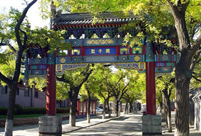 Featured hutongs in Beijing
Featured hutongs in Beijing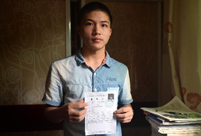 Separate college entrance exam
Separate college entrance exam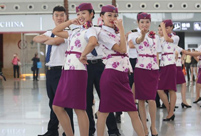 Flash mob dance
Flash mob dance Picturesque scenery of Ghost City
Picturesque scenery of Ghost City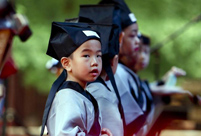 Children attend First Writing Ceremony
Children attend First Writing Ceremony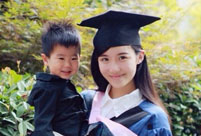 Female master poses for graduation photos with son
Female master poses for graduation photos with son Silk Road, China's Grand Canal listed as World Heritage Sites
Silk Road, China's Grand Canal listed as World Heritage Sites PKU students imitate famous paintings in real-person photos
PKU students imitate famous paintings in real-person photos Chinese 'Slumdog Millionaire'
Chinese 'Slumdog Millionaire' Islands in S. China Sea better shown on new vertical atlas of China
Islands in S. China Sea better shown on new vertical atlas of China Girl takes father’s portrait to travel the world
Girl takes father’s portrait to travel the world Images of Xi'an: Part one
Images of Xi'an: Part one In Pictures: Female fans of World Cup
In Pictures: Female fans of World Cup Top 20 hottest women in the world in 2014
Top 20 hottest women in the world in 2014  China's top 10 representative architectures
China's top 10 representative architecturesDay|Week|Month